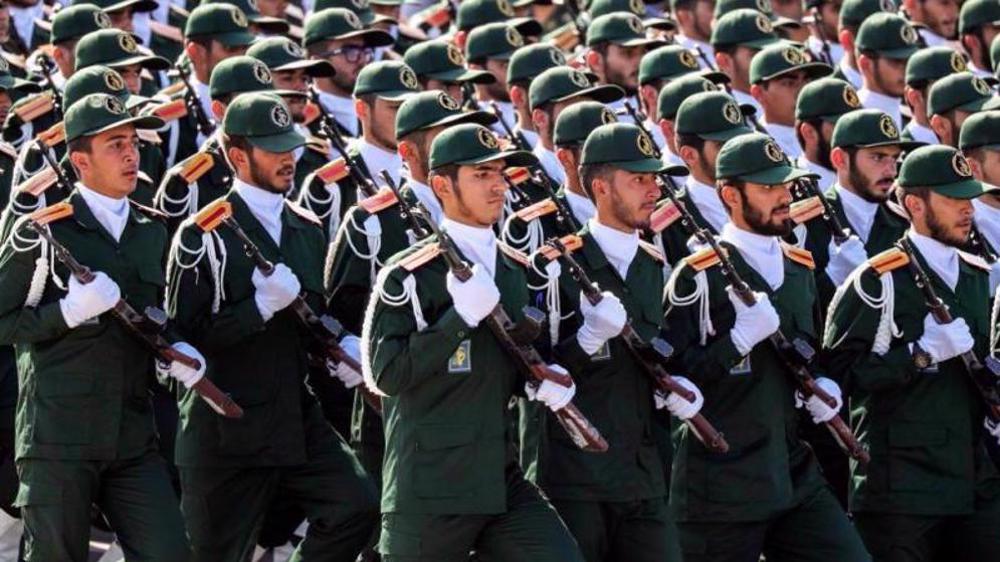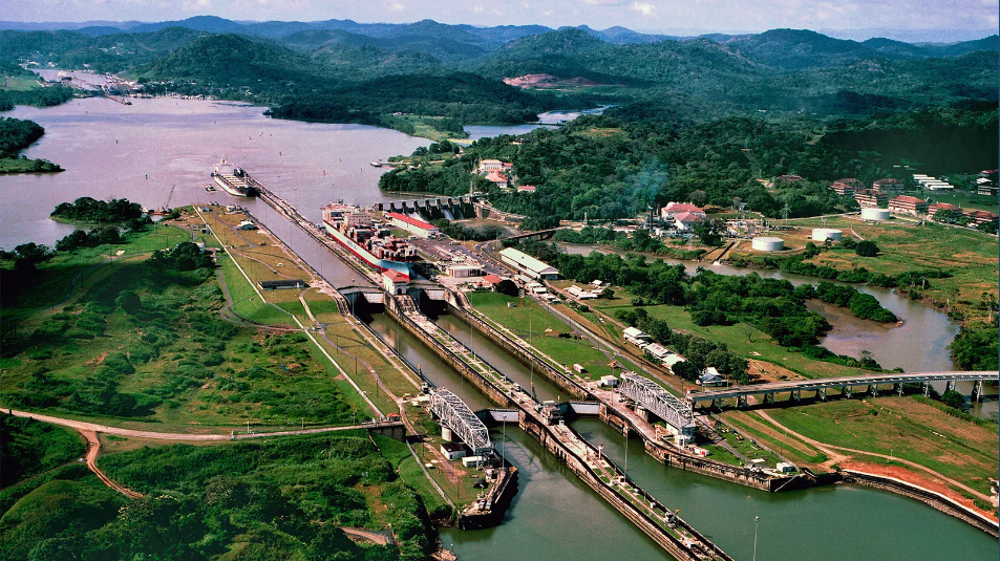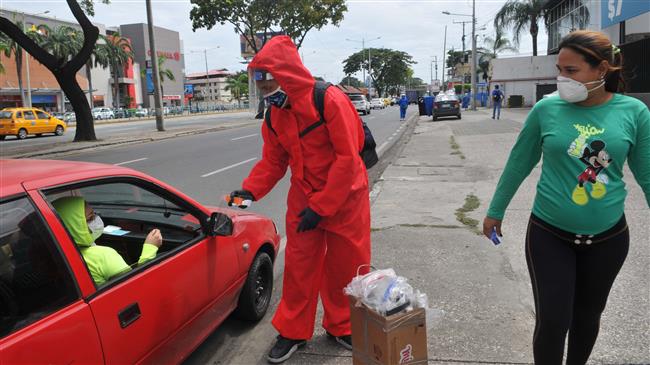People in Peru, Ecuador vote to choose presidents
People in Peru and Ecuador headed out to vote in the two countries’ presidential elections amid fears of possible low turnout due to COVID-19 pandemic.
Polls opened at 7 a.m. local time (1200 GMT) on Sunday, with twice as many sites available to voters than in previous elections as authorities try to avoid fueling a second coronavirus wave that has gripped the Andean nation.
Long queues formed outside some polling stations predominated by elderly people who were asked to arrive early to avoid crowds.
Some stations were unable to open on time because election supervisors - citizens picked at random to help run the process - failed to arrive, sparking tension at some centers and complaints on social media.
Peru's interim President Francisco Sagasti, voting early in the capital Lima, appealed to supervisors to exercise their civil duty. "In the queues there are vulnerable people who have been waiting since very early to vote," he told local television.
He appealed to Peruvians to turn out despite suggestions many could stay away for fear of contracting COVID-19.
"All possible measures have been taken to avoid contagions, there should be no fear of complying with your civic duty," he said.
Peru's National Elections Office (ONPE) put out a call in the media for more polling station volunteers, but said that by 9.16 a.m., 75% of polling stations were open to voters.
None of the 18 presidential candidates have polled more than 12% and a "no vote" is still the most popular choice for disgruntled respondents ahead of the first round of voting.
Two contenders from opposite poles of the political spectrum could face off in the second round in June. Hernando de Soto, a liberal economist, and radical leftist professor Pedro Castillo, have both edged to the front of the pack following late upticks in support, according to the latest poll.
Keiko Fujimori, the conservative, US-educated daughter of jailed former president Alberto Fujimori, is close behind, followed by populist candidate Yonhy Lescano, ultraconservative Rafael López Aliaga and leftist candidate Veronika Mendoza.
The tight race has led to jitters among market watchers of the world's second-largest copper producer.
Almost all Peru's presidents were impeached or probed for graft over the last three decades.
Carlos Checa, a voter in Lima, told Reuters TV that this time round, he had done his homework in the hope of picking someone better.
"We have been wrong so many times," he said. "Hopefully this time everyone has thought carefully about their vote, and has informed themselves properly."
Peru's 25.2 million eligible voters have been told to wear masks to prevent the spread of COVID-19 and bring their own pens to mark ballots. Peru reported 384 COVID-19 deaths on Saturday, a record daily high for the country.
Polls are scheduled to close at 7 p.m. (2400 GMT) when Ipsos is expected to publish an exit poll, followed around two hours later by fast counts. The first official results are expected by 11:30 p.m.
Ecuador begins electing new president in left-right battle
Meanwhile, Ecuadorans have begun electing their next president with voters choosing between a young, socialist protege of ex-leader Rafael Correa and a veteran conservative as the oil-rich country contends with an economic crisis aggravated by the COVID-19 pandemic.
Opinion polls have the two contenders neck and neck in a classic left versus right battle for control of the country.
Economist Andres Arauz, 36, is virtually unknown but topped February's first round of voting on the back of support from his mentor, Correa, who led the country for 10 years.
Ex-banker Guillermo Lasso, 65, is a seasoned politician and third-time presidential aspirant after having twice finished second: to Correa in 2013 and Lenin Moreno in 2017.
Polls opened at 7:00 am (1200 GMT) with voting obligatory for 13.1 million people in the tiny oil-producing South American country.
Whoever wins will take over from beleaguered Moreno on May 24 and will immediately face an economic crisis exasperated by a 7.8 percent contraction in GDP in 2020.
Overall debt is almost $64 billion -- 63 percent of GDP -- of which $45 billion (45 percent of GDP) is external debt.
At the same time, the country has been hard hit by the pandemic with hospitals overwhelmed by more than 340,000 coronavirus infections and over 17,000 deaths.
‘Technical draw'
Arauz, the candidate from the Union of Hope coalition, topped the first round with almost 33 percent of the vote, some 13 percentage points ahead of Lasso, from the Creating Opportunities movement.
Although barely known before he ran for the top office, Arauz is the protege of Correa, who would have been his running mate but for an eight-year conviction for corruption.
Correa lives in exile in Belgium, where his wife was born, and he is able to avoid his prison sentence. But his influence on Ecuadoran politics remains strong.
This election is not so much left versus right, but rather "Correism versus anti-Correism," political scientist Esteban Nicholls of Simon Bolivar University told AFP.
The two candidates can barely be separated in polls.
The last poll by Market predicted a "technical draw" on Sunday with Arauz garnering 50 percent and Lasso getting 49 percent.
The election is "totally uncertain," Market director Blasco Penaherrera told AFP.
However, Penaherrera said that former banker Lasso's "growth" is "vastly superior" to that of economist Arauz.
Uncertain indigenous vote
Lasso scraped into the runoff by less than half a percentage point ahead of indigenous candidate Yaku Perez, who contested the result and claimed to have been the victim of fraud.
It took weeks for Lasso's second place to be confirmed. Ahead of the runoff, electoral officials have decided to abandon the usual rapid count to avoid potentially misleading results.
Socialist Perez, whose Pachakutik indigenous movement is the second-largest bloc in parliament, picked up around 20 percent of the vote in the first round.
Pachakutik has refused to back either candidate in the second round, leaving uncertainty over which way its supporters will turn.
The number of undecided voters following the chaotic first round was about 35 percent but that's since shrunk to eight percent.
But this "really changed in just a few weeks," said Penaherrera.
‘Change needed'
Political scientist Santiago Basabe, of the Latin American Faculty of Social Sciences, believes Arauz has the edge.
"While either could win, it seems to me that Arauz has more chance," said Basabe.
However, "there's a feeling that to a certain extent, it doesn't matter who wins, we just need an immediate change," said Pablo Romero, an analyst at Salesiana University.
Should Lasso win he would face a tough job with Arauz's leftist coalition the largest bloc in Congress.
"There will be permanent tension with the executive. There's almost no chance of the reforms the country needs."
(Source: Agencies)

Eleven killed after car rams into crowd at Vancouver Filipino festival

Tehran slams Paraguay’s blacklisting of IRGC as illegal, tied to Israeli agenda

Panama rejects Pentagon chief's idea of US bases on its soil
IAEA director speaks with Araghchi about Iran-IAEA cooperation
US airstrike on Yemeni capital kills 8 people
VIDEO | Iran multilayered diplomacy
VIDEO | Press TV's news headlines
Iran more than halved its power grid losses to 10% in 16 years: Expert
Abbas names likely successor in move deemed ‘illegitimate, divisive’
Illegal Israeli settlers attack Palestinian school in occupied West Bank
VIDEO | Israeli forces tighten siege on Jenin refugee camp











 This makes it easy to access the Press TV website
This makes it easy to access the Press TV website